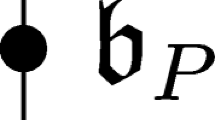Abstract
Framing effects occur when different descriptions of the same decision problem give rise to divergent decisions. They can be seen as a violation of the decision-theoretic version of the principle of extensionality (PE). The PE in logic means that two logically equivalent sentences can be substituted salva veritate. We explore what this notion of extensionality becomes in decision contexts. Violations of extensionality may have rational grounds. Based on some ideas proposed by the psychologist Craig McKenzie and colleagues, we contend that framing effects are justified when the selection of one particular frame conveys choice relevant information. We first discuss this idea from a philosophical point of view, and proceed next to formalize it first in the context of the Bolker–Jeffrey decision theory. Finally, we extend the previous analysis to non-expected utility theories using the Biseparable Preference model introduced by Ghirardato and Marinacci (2001) and therefore show that the analysis is independent of the assumptions of Bayesian decision theory.
Similar content being viewed by others
References
Ahn, D. S., & Ergin, H. (2007). Framing contingencies. Unpublished Manuscript, University of California, Berkeley.
Arrow K.J. (1982) Risk perception in psychology and economics. Economic Enquiry 20: 1–9
Cohen M., Jaffray J.-Y. (1980) A theory of decision under complete ignorance. Econometrica 48(5): 1281–1300
Ghirardato P., Marinacci M. (2001) Risk, ambiguity, and the separation of utility and beliefs. Mathematics of Operations Research 26: 864–890
Gilboa, I. (eds) (2004) Uncertainty in economic theory: Essays in Honor of David Schmeidler’s 65th Birthday. Routledge, London
Giraud, R. (2004). Framing under risk: Endogenizing the reference point and separating cognition and decision. Cahiers de la MSE Bla04090. Université Paris I, France.
Gold N., List C. (2004) Framing as path-dependence. Economics and Philosophy 20(2): 253–277
Kahneman D., Tversky A. (1979) Prospect theory: An analysis of decision under risk. Econometrica 47: 263–291
Koppelberg S. (1989) General theory of Boolean algebras. In: Monk J.D., Bonnet R. (eds) Handbook of Boolean algebras. North Holland, Amsterdam
Kühberger A. (1998) The influence of framing on risky decisions: A meta-analysis. Organizational Behavior and Human Decision Processes 75(1): 23–55
Le Menestrel M., Lemaire B. (2006) Ratio-scale measurement with intransitivity and incompleteness: The homogeneous case. Theory and Decision 60: 207–217
Le Menestrel M., Van Wassenhove L. (2001) The domain and interpretation of utility functions: An exploration. Theory and Decision 51: 329–349
Levin I.P., Schneider S.L., Gaeth G.J. (1998) All frames are not created equal: A typology and critical analysis of framing effects. Organizational Behavior and Human Decision Processes 76(1): 149–188
Lipman B. (1999) Decision theory without logical omniscience: Towards an axiomatic framework for bounded rationality. Review of Economic Studies 66: 339–361
Malinvaud E. (1952) Note on the von Neumann-Morgenstern’s strong independence axiom. Econometrica 60: 679
McKenzie C.R.M., Nelson J.D. (2003) What a speaker’s choice of frame reveals: Reference points, frame selection, and framing effects. Psychonomic Bulletin and Review 10(3): 596–602
Quattrone G.A., Tversky A. (2000) Constrasting rational and psychological analyses of political choice. In: Kahneman D., Tversky A. (eds) Choice, values and frames. Cambridge University Press, Cambridge
Rubinstein A. (2000) Modeling bounded rationality. MIT Press, Cambridge
Sen A. (1986) Information and invariance in normative choice. In: Heller W.P., Starr R.M., Starret D.A. (eds) Social choice and public decision making (Essays in Honor of Kenneth J. Arrow, Vol. 1). Cambridge University Press, Cambridge
Sher S., McKenzie C.R.M. (2006) Information leakage from logically equivalent frames. Cognition 101: 467–494
Tversky A., Kahneman D. (1992) Advances in prospect theory: Cumulative representation of uncertainty. Journal of Risk and Uncertainty 5: 297–323
Tversky A., Kahneman D. (2000) Rational choice and the framing of decisions. In: Kahneman D., Tversky A. (eds) Choice, values and frames. Cambridge University Press, Cambridge
Tversky A., Simonson I., Shafir E. (2000) Reason-based choice. In: Kahneman D., Tversky A. (eds) Choice, values and frames. Cambridge University Press, Cambridge
Author information
Authors and Affiliations
Corresponding author
Rights and permissions
About this article
Cite this article
Bourgeois-Gironde, S., Giraud, R. Framing effects as violations of extensionality. Theory Decis 67, 385–404 (2009). https://doi.org/10.1007/s11238-009-9133-7
Received:
Accepted:
Published:
Issue Date:
DOI: https://doi.org/10.1007/s11238-009-9133-7




